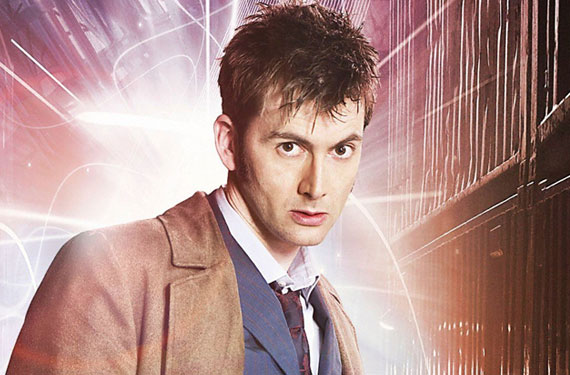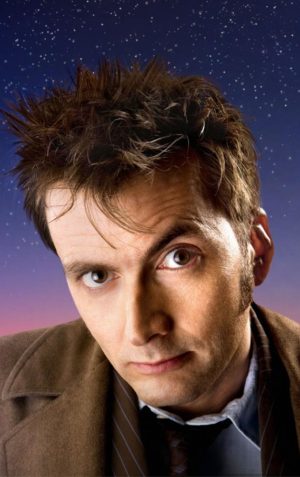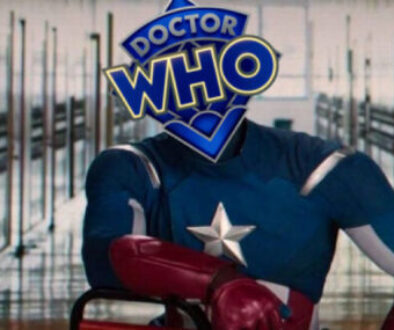Why I Love The Tenth Doctor

Mark McCullough celebrates Tennant’s incarnation of the Doctor.
There’s no denying that some of you have read the title to this article and thought to yourself “Oh, here we go again, another love letter to the Tenth Doctor.” I realise that the Tenth Doctor is quite divisive these days, and I’m not going to hide from that fact. All I ask is that leave any preconceptions you have about the character behind for a moment and read the argument I have presented. It’s the least we can do for Tennant’s birthday.
“Don’t you think she looks tired?” – The Tenth Doctor, The Christmas Invasion
 What better place to start analysing a character than their first episode? It is here where one of the most notable characteristics of the Tenth incarnation of the popular Time Lord is first highlighted. Granted, it has to be seen in retrospect because it doesn’t become obvious until we can see a complete picture. The character trait in question is actually his unintentional self-destructive nature. Gestures that seem insignificant at the time, but ultimately come back to haunt him:
What better place to start analysing a character than their first episode? It is here where one of the most notable characteristics of the Tenth incarnation of the popular Time Lord is first highlighted. Granted, it has to be seen in retrospect because it doesn’t become obvious until we can see a complete picture. The character trait in question is actually his unintentional self-destructive nature. Gestures that seem insignificant at the time, but ultimately come back to haunt him:
- His anger at Harriet Jones led to her standing down, allowing the Master to assume power.
- His compassion to Mr. Cooper led to him giving the money which was ultimately used to create the Sub-wave communication network used by Harriet Jones.
- His hope that the Dalek race was capable of change coupled with his willingness to show mercy and avoid genocide, allowed Caan the opportunity to escape which ultimately set up the Series 4 finale.
The common pattern is that whatever the Tenth Doctor did, it in some way contributed to his downfall regardless of what emotion was demonstrated. The only way to explain that is via the concept of destiny which in itself is a very romantic natured idea. Not only that but it also holds a lot of religious connotations, which complement the characterisation of the Tenth Doctor. As the most human take on the Doctor’s character so far, it makes him the most relatable. Yet still there is something about him that sets him apart from everyone else.
“You must have been like God.” – The Master, The Sound of Drums”
 If you’re easily offended by comparisons being drawn to religious aspects you might want to skip this small section of the article. You have been warned. The most obvious religious parallel that can be drawn is the fact that the Doctor actually fought against something which called itself the devil (aka the Beast). In the grand scheme of the good versus evil themes of the bible, this places the Doctor on the side of good. We also have the parallels of the Doctor in all incarnations post War between the vengeful God of the Old Testament, standing in judgement over all for their sins.
If you’re easily offended by comparisons being drawn to religious aspects you might want to skip this small section of the article. You have been warned. The most obvious religious parallel that can be drawn is the fact that the Doctor actually fought against something which called itself the devil (aka the Beast). In the grand scheme of the good versus evil themes of the bible, this places the Doctor on the side of good. We also have the parallels of the Doctor in all incarnations post War between the vengeful God of the Old Testament, standing in judgement over all for their sins.
There are many instances where the power of a Time Lord is likened to that of a god. Therefore the events of Human Nature/ The Family of Blood give rise to an interesting comparison. We have a situation where a god is making himself human in an act of mercy instead of vengeance. That may appear as a stretch, and alone I would say that it is, but coupled with some of the other similarities it looks more feasible.
In terms of other evidence we have the Doctor ascending lifted by two angels in The Voyage of the Damned, the miracle of the Lazarus Experiment, the fact that he arrived to try to lead humanity to Utopia at the end of the universe (obvious connection with judgement day), his actions in The Waters of Mars when tempted by the power of time, knowing his death was to come but ultimately accepting it, and finally dying to save he who believed in him most. The parallels between the Tenth Doctor and Jesus are certainly interesting to consider, especially given how they complement the character’s story arc. Whether authorial intention was actually there or not is another question entirely.
“Quite right too” – The Doctor, Doomsday
 Another key aspect of the Tenth Doctor’s characterisation is interaction with others, particularly those who are female. Of his multiple relationships, the most notable of these is of course Rose. Now I appreciate that this particular relationship is maligned by a fair portion of the fandom, but I don’t think it should be. To understand the reasons behind it we need to go back to the Ninth Doctor where we have a man hardened by war, who has committed a terrible act and is the last of his kind. It is only natural that this man would have a certain element of self-hate, and would have a particularly negative view on life. This is portrayed excellently by Eccleston.
Another key aspect of the Tenth Doctor’s characterisation is interaction with others, particularly those who are female. Of his multiple relationships, the most notable of these is of course Rose. Now I appreciate that this particular relationship is maligned by a fair portion of the fandom, but I don’t think it should be. To understand the reasons behind it we need to go back to the Ninth Doctor where we have a man hardened by war, who has committed a terrible act and is the last of his kind. It is only natural that this man would have a certain element of self-hate, and would have a particularly negative view on life. This is portrayed excellently by Eccleston.
However by the time we reach the Tenth Doctor, Rose’s influence has changed him. She has shown him another way to live, and how to love again. It can’t come as a huge surprise that she becomes one of the targets of this love. More importantly a large chunk of that is directed to himself which makes a nice contrast to his predecessor. It is also why I feel the Doctor’s decision not to regenerate and his final line of “I don’t want to go” complement the character perfectly.
Rose’s relationship is not the only significant one introduced during the Tenth Doctor’s era. His relationship with Martha is one which he later comes to regret as he is so caught in his grief for Rose that he doesn’t give her the time she deserves. With Donna, it is quite unusual because there is no romantic element to their friendship, but that made it fresh and arguably the best Doctor-Companion dynamic. Steven Moffat captured the Tenth Doctor’s romantic nature better than any other writer through his relationships with Reinette, River Song and Queen Elizabeth. It’s interesting that the Tenth Doctor was able to attract such a wide range of women towards him, yet still each was believable, an obvious testament to the character’s charm.
“I don’t want to go” – The Tenth Doctor, The End of Time
 A common criticism levelled at the Tenth Doctor is the fact that he undergoes very little character development. In essence, he is a similar man in The End of Time to what he was at the start of his era. But that’s perfectly fine, in fact I would argue that it is better because it fits the character and his journey perfectly. If we examine his story closely, series by series we see that the character development is there.
A common criticism levelled at the Tenth Doctor is the fact that he undergoes very little character development. In essence, he is a similar man in The End of Time to what he was at the start of his era. But that’s perfectly fine, in fact I would argue that it is better because it fits the character and his journey perfectly. If we examine his story closely, series by series we see that the character development is there.
In Series Two his relationship with Rose blossoms throughout, culminating in the finale. Unfortunately circumstances dictated that they were never to be as Rose was cruelly and unexpectedly snatched away from him. This causes his character to become clouded with grief, which in turn influences his relationship with Martha. On a superficial level in Series Three he appears to act in the same vein as before for the majority of the time. However there are moments where his grief for Rose consumes his entire thought process and blind him to the value of Martha. Ironically Martha was helping him out of his grief (paralleling the Doctor’s development in Series Two), but his blindness toward her pushed her away and added guilt and further grief to his situation.
This snowball effect sees the Tenth Doctor drop deeper than ever before, isolating himself from taking another companion to spare himself the pain of another loss. It is only through Donna Noble’s persistence that she persuades him to left her join him in travel. Throughout Series Four, the Tenth Doctor goes on the exact same trajectory as his previous two series as Donna helps him to become positive again. This only last until the finale however as Donna undergoes a Human-Time Lord Metacrisis placing her life in danger unless the Doctor wipes her mind. He decides to suffer so as she doesn’t have to, but this also means that he has lost another companion. Couple this with the fact that he has had to say goodbye to Rose again, leaving her with someone who is him in almost all ways. It is poetic that after the episode with the largest gathering of his friends, that the Tenth Doctor is more alone than ever.
He continues his isolation for an unspecified length of time which leads him to Mars where he meets Adelaide Brooke. Before this however he is given a prophecy about his death. In his isolation, grief and in an attempt to avoid his fate, the Doctor has what could best be described as a mental breakdown and assumes the role of the Time Lord Victorious. Realising what he has become, he accepts his fate, but still tries to avoid it for as long as he can something which is also in keeping with his last words. When he eventually goes to Earth he finds companionship in the form of Wilf and we see him finally able to let out some of what had been worrying him.
When events transpire to put Wilf in danger, the Doctor repeats the gesture of the Series Four finale taking personal suffering for the sake of a friend’s life. Granted he isn’t happy about the situation, but what else do you expect when he has been running from it for such a long time. What he does next is a defining moment for his character, he goes to visit each of his friends and sees that they are all living a good life. He has also justified to himself that his decision to activate the moment was the correct one. For the first time in this incarnation he is guilt free. But he’s dying, which is about as ironic as it gets.
Amazingly the Doctor’s character arc over the four series could be summed up in two words: Chronic Depression. It may not appear obvious at first glance but the Tenth Doctor fits the expected pattern for chronic depression, a graph with peaks of normal mood and toughs of depression over a period of many years. When we see him during the series he is with his companion for the majority of the time so we see him at his highs, but if we look at the gaps between seasons and the Doctor’s behaviour in the series openers and specials we can formulate a picture of his troughs. And how fitting is it that the most human Doctor of them all has a character arc of this style.
It is my take on the character that this journey is what forms his development and that’s exactly why he comes full circle again by the denouement of The End of Time. He has no reason to feel guilty any more as the Time Lords actions allow him to reconcile to himself. This ultimately proves to be the turning point leading to the attitude presented by the Eleventh Doctor in The Day of the Doctor. Understandably Ten is annoyed that after having a huge weight finally lifted off his shoulders, he has no life left to enjoy it. Who would want to go in that situation?
“I have such fond memories of watching ‘Doctor Who’ when I was a kid and growing up, that if I’ve left anybody anywhere with memories as fond, then I feel like I’ve done my job.” – David Tennant
If that was Tennant’s goal when setting out as the Tenth Doctor, I think it’s safe to say that he delivered. Tennant delivered a top notch performance in the role of an exceptional character. He managed to convince me that the only Doctor I had ever seen was replaceable, and done so with ease. He will always hold a special place in my heart and a position in the upper echelons of my ever changing top Doctor’s list. I can’t thank David enough for being so perfect in the role. Hopefully we can all join together in celebrating the Tenth Doctor and wishing the wonderful David Tennant a very happy birthday indeed.








